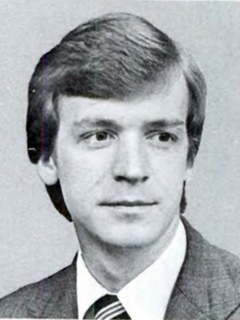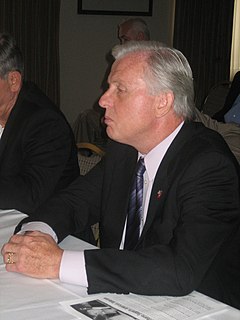
The 1986 United States Senate elections was an election for the United States Senate in the middle of Ronald Reagan's second presidential term. The Republicans had to defend an unusually large number of freshman Senate incumbents who had been elected on President Ronald Reagan's coattails in 1980. Democrats won a net of eight seats, defeating seven freshman incumbents and regaining control of the Senate for the first time since January 1981. The party not controlling the presidency gained seats, as usually occurs in mid-term elections.

Raymond Philip "Ray" Shafer was an American attorney and politician who served as the 39th Governor of Pennsylvania from 1967 to 1971. Previously, he served as the 23rd Lieutenant Governor of Pennsylvania from 1963 to 1967 and a Pennsylvania State Senator from 1959 to 1962. He was a national leader of the moderate wing of the Republican Party in the late 1960s.

Donald Allen "Don" Bailey is an American politician and lawyer, from the Commonwealth of Pennsylvania. He was a Democratic member of the United States House of Representatives from 1979 to 1983, Auditor General of Pennsylvania from 1985 to 1989, and a candidate for the Democratic nomination for United States Senate and Governor of Pennsylvania. His Congressional District (PA-21) included all of Westmoreland County, Pennsylvania with a sliver of Allegheny County, Pennsylvania, prior to the 1981 redistricting.

Peter Houston Kostmayer is a Democratic politician who served seven terms in the U.S. House of Representatives from Bucks County, Pennsylvania.

Jack E. Wagner is a Democratic politician from Pennsylvania. He is a former State Auditor General, and has also served in the State Senate and Pittsburgh City Council.

The Pennsylvania Gubernatorial election of 1998 was held on November 3, 1998. It was between incumbent Republican Tom Ridge, Democrat Ivan Itkin, Constitutionalist Peg Luksik and Libertarian Ken Krawchuk. Ridge, a popular moderate, won with 57% of the votes cast.

The Pennsylvania gubernatorial election of 1994 was held on November 8, 1994. The incumbent governor, Bob Casey, Sr. (Democrat), was barred from seeking a third term by the state constitution. The Republican Party nominated Congressman Tom Ridge, while the Democrats nominated Mark Singel, Casey's lieutenant governor. Ridge went on to win the race with 45% of the vote. Singel finished with 39%, and Constitution Party candidate Peg Luksik finished third, garnering 12% of the vote.

The Pennsylvania Gubernatorial election of 1990 was held on November 6, 1990. Incumbent Democratic Robert P. Casey easily defeated Republican Barbara Hafer. Governor Casey defeated Ms. Hafer by a margin of 35.29%, and carried 66 out of 67 Pennsylvania counties.

The Pennsylvania Gubernatorial election of 1986 was held on November 4, 1986. Democrat Bob Casey narrowly defeated Republican Bill Scranton III, in a race that featured two very high-profile candidates.

The Pennsylvania gubernatorial election of 1978 was held on November 7, 1978 between Republican Dick Thornburgh and Democrat Pete Flaherty.

The Pennsylvania gubernatorial election of 1970 was held on November 3. Democrat Milton Shapp challenged incumbent Republican Lieutenant Governor Ray Broderick.

The Pennsylvania gubernatorial election of 1799 was between two candidates. Incumbent governor Thomas Mifflin was not running. The race was between Federalist U.S. Senator James Ross and Democratic-Republican Thomas McKean. The retired Chief Justice of the Pennsylvania Supreme Court, McKean was a Federalist and a Mifflin ally, as both supported strong state executive power but rejected the domestic policies of the national government.

The 1974 Massachusetts gubernatorial election was held on November 5, 1974. Michael Dukakis was elected to a four-year term, from January 4, 1975 until January 4, 1979. He defeated incumbent Governor of Massachusetts Francis W. Sargent in the general election.

The Pennsylvania gubernatorial election of 1966 was held on November 8. Republican Ray Shafer, the state's incumbent Lieutenant Governor, was elected to the state's highest office after holding off a charge from future governor Milton Shapp.

The Pennsylvania gubernatorial election of 1962 was held on November 6. Republican Bill Scranton and Democrat Richardson Dilworth, each a member of a powerful political family, faced off in a bitter campaign.

The Pennsylvania gubernatorial election of 1958 was held on November 4. Democrat David Lawrence defeated Republican Art McGonigle by a smaller than anticipated margin.

The Pennsylvania gubernatorial election of 1950 was held on November 7. For the twenty-second time in twenty-five elections, the Republican candidate was victorious, but by a much smaller than usual margin. Superior Court Judge John S. Fine defeated Democrat Richardson Dilworth, the City Controller of Philadelphia.

The Pennsylvania gubernatorial election of 1946 was held on November 5, 1946. Republican Party nominee James H. Duff defeated Democratic Party nominee John S. Rice to become Governor of Pennsylvania.
The Milton Shapp presidential campaign of 1976 began when then-Governor of Pennsylvania Milton Shapp elected to seek the Democratic Party nomination for President of the United States in the 1976 election. Shapp had won reelection as Governor of Pennsylvania in the 1974 election—the first Pennsylvania Governor to be elected to a second four-year term following an amendment permitting this in 1967—and had hoped to translate his relative popularity in Pennsylvania into the groundwork of a presidential campaign.
























